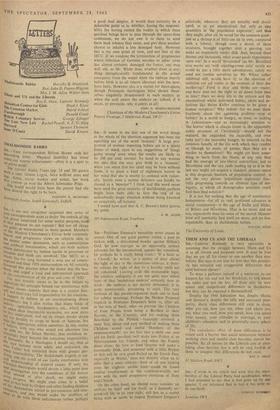Stu,—Professor Empson's versatility never ceases to amaze. One of our
great pioneer critics, a poet to reckon with. a determined bowler against Milton's God, he now emerges as an apparently serious advocate for the unconceived, against the conceived. Or perhaps he is really being ironic? 'If a State or a Church.' he writes, 'as a matter of duty allows the light of day to the monstrous embryo. it there- by refuses the light of day to a healthy child not yet conceived.' Leaving asEde this memorable logic, the emotive ambiguity (1 am not quite sure which type) of that `monstrous embryo' certainly does its work: the embryo is not merely deformed; it is, quite monstrously, presuming to exist. The very violence of this pseudo-argument leads one to look for subtler meanings. Perhaps the Modest Proposal implicit in Professor Empson's letter is, after all, in the vein of Swift, who—to prevent 'the Children of Poor People from being a Burthen to their Parents, or the Country, and for making them Beneficial to the Pithlick'—famously invented a most 'fair, cheap and easy method of making these Children sound and useful Members of the common-wealth'; yet the fact that a child one year old (as Swift specifies) 'will make two Dashes at an Entertainment for Friends, and when the Family dines alone, the fore or hind Quarter will make a reasonable Dish, and seasoned with a little Pepper or Salt will be very good Boiled on the fourth Day, especially in Winter,' does not directly allow us to infer that a mere embryo-- least of all one lacking even the slightest usable limb—could be found similar employment in the common-wealth, not even with the most progressive exertions of State and Church.
On the other hand, we should never consider an embryo by itself and for itself, as a humanly en- gendered life in its own right, still less as a sacred being such as seems to inspire Professor Empson's
solicitude, whenever they are suitably well devel- oped, or as yet unconceived, but only as tiny quantities in 'the population explosion'; and thus they might, after all, be saved for the common good: just as a shrimp is of little use on its own, compared with a lobster; though even a dozen of these creatures, brought together over a gas-ring, can make an exquisitely tender dish. And, beyond these dozens and thousands, what avant-garde experiments open out! In a world 'threatened' (as Mr. Blomfield also warns us) 'with standing-room only' surely we could be just a little more adventurous; surely we need not confine ourselves (a:: Mr. White, rather inhibited still, would have it) to the abortion of embryos not yet viable at the moment of their dis- mothering? Food is dear and births are—many; and have men not the right to sit down from time to time? Dare we deny life to the unborn and the unconceived whilst deformed babies, idiots and de- fectives like Helen Keller continue to be given a human reception? Why indeed—for we must think fearlessly about this agonising problem—stop at babies? In a world so hungry, so tense, so lacking in Lebensraum—and so increasingly sensitive to 'the horror which is always latent in the apparently noble structure of Christianity'—should not the maimed, the anguished, the incurable, and even (why not?) the incurably hungry, be relieved, to the common benefit, of the life with which they trouble us (though no more, of course, than they are a burden to themselves)? We might yet have some- thing to learn from the Nazis; at any rate they had the courage of late-liberal convictions; just as Hiroshima and the city raids leading up to it in the last war might yet acquire a classical, pioneer status in this desperate business of population control: is not the very phrase 'population explosion' fear- fully progressing towards an ultimate type of am- biguity, in which all demographic anxieties could find their final solution?
It is not for nothing that the age of sentimental humaneness—for all its real, profound advances in social compassion—is the age of Stalin and Hitler, of Belsen and Hiroshima. Man is no more, and no less, expendable than his sense of the sacred. Human- kind will inevitably find itself no more, and no less, expendable than its thalidomide babies.
WALTER STEIN
The University of Leeds


































 Previous page
Previous page